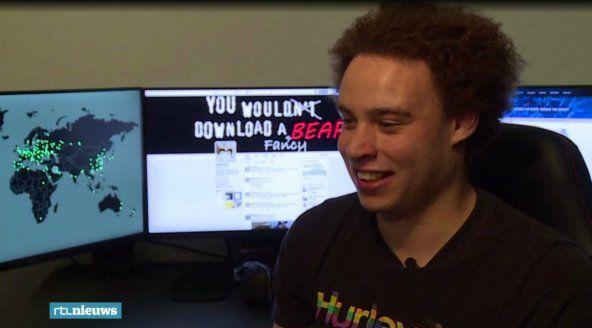
Despite the fact that young people are being considered to be good with computers there is still only a relatively small number of people studying Computer Science or actively engaged in (ethical) hacking. An often heard argument is that there should be more initiatives to make young people choose for a career in ICT. Fortunately there are exceptions. Every now and then an young talent steps up to take up the role as an ambassador for cyber security.
Wannacry
Perhaps the most famous is 22 year old Briton Marcus Hutchins. About a week ago the Wannacry ransomware made headlines as computers all over the world were being encrypted by the malicious software. In the UK over a dozen hospitals had to cancel operations because their systems were locked. The solution to the vastly spreading ransomware Wannacry came from an unsusual suspect: Marcus. He was going through the code of Wannacry and found an odd looking website. Out of curiosity to see what would happen he decided to register the domain. By doing so he activated what is called the ´killswitch´ of the software. The number of new infections immediately declined rapidly and he was instantly seen as an hero. He doesn´t see it that way though. To the press he said "I was just doing my job, and don't think i'm a hero."
Hack your high school
Another example is the 13-year-old hacker Sem. Sem just started at his new high school Isendoorn-college in Warnsveld (The Netherlands) and managed to hack his school. He developed a hacking tool which he carried to school on a USB stick. “I insert my USB stick into the teacher' computer when he goes to the toilet. I then run the programme and all passwords will appear on my own computer.” Sem demonstrated his programme to the network administrator who was astonished by the fact that a student was able to hack into the network.
According to the young hacker, it’s just a matter of trying to learn how a computer or system works, and the more you practice the more efficient your hacks will be. Therefore, it is important that Dutch ministries, such as the Ministry of Defence, recruit more young hackers. Because youngsters will learn more if they practice at the same time. “I would definitely accept a job if they would call me”, Sem says.
From Eindhoven to Silicon Valley
Another example of someone that turns his hobby into a job is BitSensor co-founder Ruben van Vreeland who started to experiment with hacking when he was only 9 years old. He started with testing the security of websites and look for vulnerabilities in the high school software. His curiosity for cybersecurity eventually led to founding BitSensorwith his friend Alex Dings. BitSensor is basically a radar to detect hackers, in this (Dutch) interview he elaborates on his story and company. BitSensor started to grow quickly and was mentioned as one of the best start ups in the world in 2015. The company got into a windfall and even had the opportunity to open a branch in Silicon Valley, which he declined as he prefers to build up BitSensor in his hometown Eindhoven.
“You can hack everything as long as you invest sufficient time and money in it” Ruben says. One of the things he worried about was the fact that many businesses, in particular banks, were only thinking from the efficiency perspective rather than the security perspective. As a result, those businesses became vulnerable and an easy target for hackers.
Young Ambassadors
These examples demonstrate that it’s not all that bad in Cybersecurity land. Young talents are important to show a new generation that you can actually turn your hobby into a job and make a career in cyber security. Just by practising and being curious you develop skills that are in high demand with organisations. These young ambassadors are exactly what cybersecurity needs to attract more people, an example to many!